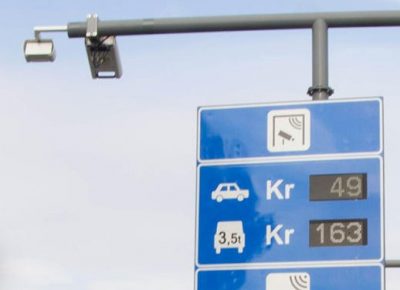UPDATED: Hundreds of motorists in the Oslo area drove very slowly on the main E18 highway into the Norwegian capital Thursday evening, part of another protest against more and higher road tolls. Their demonstration was the latest grass-roots effort to literally set up roadblocks to another increase in Norway’s already high cost of driving.

“We’ve been inspired by the protest actions in Stavanger,” Cecilie Lyngby, who led the unusual motorcade into Oslo, told newspaper Aftenposten. Drivers of nearly 500 cars had signed up to take part in the demonstration as of Wednesday afternoon. Nearly 200 actually took part, plus motorcycles.
Aftenposten reported how they’d planned to meet outside local police headquarters in suburban Sandvika at 6pm and then drive at a speed of just 15-20 kilometers an hours (max 12 mph) to Oslo’s Bygdøy exit, before proceeding into downtown, honking their horns along the way. The honking could be heard for blocks away as they drove through town.
They’re protesting plans by politicians in both Oslo and suburban Bærum to set up 53 new toll plazas in and around Oslo on March 1 next year. In addition to the current toll road that wraps around Oslo (known as Ring 3), new tolls will also be charged along an inner roadway known as Ring 2. It’s already been altered to restrict driving of personal cars, to make more room for bicyclists and bus traffic. Starting next spring, those driving on it will also get hit with tolls, as will those driving into Oslo from Romerike in the northeast and Follo in the southwest.
Coming and going
Commuters from the western suburbs in Sandvika and elsewhere in its municipality of Bærum have already been paying tolls for years. They recently rose, to as much as NOK 59 for drivers of diesel cars into Oslo at Skøyen plus another NOK 18 at the border between Oslo and Bærum. That can total the equivalent of USD 9.30.
As of next spring, when the new toll plazas are rolled out, drivers will also get hit by toll charges in both directions in and out of Oslo. The tolls, hammered out after lengthy negotiations between Oslo’s Labour Party-led city government that’s eager to restrict driving into the capital and Bærum’s Conservatives-led government, which opposes tolls and higher taxes in principle. The Bærum officials had to give in to the tolls, however, in order to secure financing for expansion of the long-overburdened E18 highway running west from Oslo.

Lyngby’s Facebook page devoted to cutting back on road tolls had around 32,000 members as of Wednesday evening, with as many as 12,000 signing on just during the last few weeks. That’s when a road toll revolt in the Stavanger area first caught national attention. It has since intensified, to the point that local politicians have sought police protection when they hold meetings.
Lyngby’s group hasn’t lagged behind, however. She also organized a protest last fall that gathered thousands of demonstraters outside Oslo’s City Hall. Now she sees a need to remind the politicians that many vehemently object to the new road toll plans. Drivers of diesel cars can face daily tolls of well over NOK 100 (USD 12).
“I started this protest action because very many people will be affected by the new toll plazas,” Lyngby told Aftenposten. “I get messages every day from single mothers, for example, who struggle financially, and I’ve heard about children who have to cut out after-school sports because of the road tolls.” She claims that despite improvements to public transportation, it’s “impossible” for an active family to get everywhere they need to be without a car.
“The new tolls and toll plazas will make it much too expensive for many parents to drive,” Lyngby said.
She faced some opposition herself from members of her group on Thursday after it emerged that politicians from both the Conservative and Progress parties had been invited to take part in the demonstration. Some stressed the protest action should remain a grass-roots movement and not evolve into a political support group.
Lyngby maintains that everyone should be welcome. New Transport Minister Jon Georg Dale of the Progress Party, which has long opposed road tolls but was forced into a compromise to secure road funding, said it’s ultimately up to the local politicians to accept or reject road tolls. He said he understood the motivation for Thursday’s planned protest, but stressed that motorists can influence the level and extent of road tolls by how they vote in local elections.
newsinenglish.no/Nina Berglund

